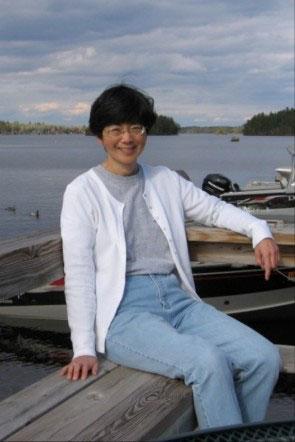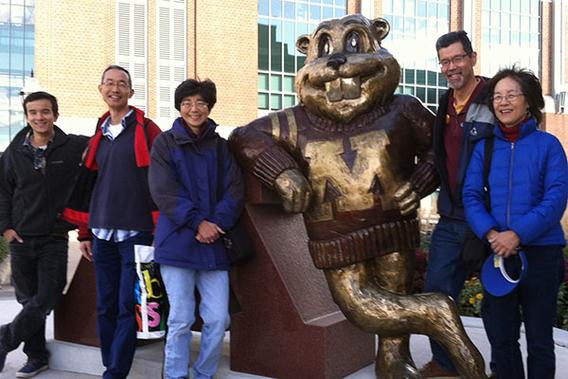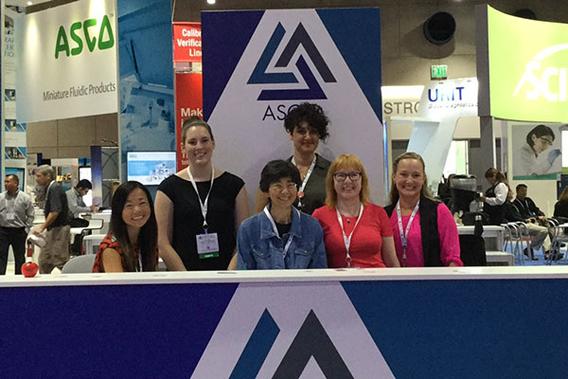
My grandfathers came to the US from Japan in the early 1900’s to work on the railroads. They eventually sent for their brides and settled on the West Coast. After Pearl Harbor and Executive Order 9066, both families were incarcerated at the Tule Lake War Relocation Camp in California, and that’s how my parents met. Dad volunteered for the Army to get out of the camp and knew enough Japanese to qualify for the Army Military Intelligence Service (MIS) Japanese Language School. The school was in San Francisco but relocated to Minnesota (Camp Savage) when Minnesota Governor, Harold Stassen, and Mayor of Minneapolis, Hubert Humphrey, said they would welcome the Japanese Americans to Minnesota. The school later moved to Fort Snelling. Dad remained stationed there during World War Two. He was a radio operator and intercepted information from Japan and gave it to the students to translate. When Dad asked Mom to marry him, Mom was able to find a sponsor and a job in Minneapolis, so she also was able to leave Tule Lake.
After the war, my parents decided to settle in Minneapolis where they had been welcomed, rather than return to the discrimination they knew they would face on the West Coast. The rest of the family members on both sides followed my parents to Minneapolis when the camps closed.
So I grew up in Minneapolis, the only Asian American in my grade at school. When it came time to decide about college, I figured I would be going, just like all of my friends. Even though dad didn’t think girls needed to attend college, luckily for me, a family friend was a University of Minnesota professor and convinced him I should go. I worked summers and commuted to the U from home until my senior year when I shared a house near campus with four college classmates.
I started college thinking I would be a nurse, like my Aunt Grace. At that time, women were encouraged to be teachers or nurses. I volunteered at St. Mary’s Hospital as a “candy striper” and one day had an opportunity to visit the laboratory. I was fascinated by the instruments and what they could do, and I changed my major to medical technology (now medical laboratory science). Our program involved a full year of rotations in all the departments, including working the night shift at the University Hospital Laboratory (now MHealth Fairview), and we had an option for a rotation doing a research project. I also worked as a phlebotomist before our rotation hours. We were very well prepared to work in the lab following graduation!

I joined the staff as a technologist in chemistry at the University of Minnesota Hospital laboratory and worked there for seven years. I had the opportunity to assist with the medical technology student program during that time. I also changed jobs and worked with one of the pathologists doing method development. In those days, we made our own reagents for various automated instruments, so I learned how to do method validation studies.
When the pathologist I was working for moved to Portland, Oregon, he asked if I would like a job there at Good Samaritan Hospital. Dad was born in Portland and grew up on a farm outside of Vancouver, WA. By this time, my grandparents and cousins were in Seattle, so I had family in the area. I decided to move and continued to do research for the pathologist. This included doing research at the Primate Center and developing a cumulative laboratory report (in the days before computers were used for reporting).
After three years in Portland, I moved to Seattle. The clinical chemist from Good Samaritan had a chemist friend at Swedish Hospital Laboratory and I was able to get a job there, working as a toxicology technologist. When an education and safety coordinator position opened up, I applied and was accepted. I became the Medical Technology Program Director which was one of my favorite jobs. We had a medical technology program for six students who already had a bachelor’s degree. They spent a full year rotating through the various departments. Our clinical chemists, technologists, and pathologists gave the lectures. I wrote objectives and tests and did student evaluations. Each year’s class had different personalities and it was amazing to watch the transformation from students who hadn’t been in a clinical laboratory before, to graduates who were very well prepared to step into the workforce.
The Swedish lab changed owners a few times, but I was with the same group of people for 26 years. When the medical technology program closed, my job became quality assurance and safety coordinator, and then later I became the chemistry supervisor. The lab was a full-service laboratory and frequently had new instruments to evaluate, something I still loved to do. Through a colleague in our city-wide Quality Assurance Focus Group, I found out about an opportunity for a lab manager position at Overlake Hospital in Bellevue. Although that position was eliminated shortly after I arrived, I accepted the chemistry supervisor position. During my time at Overlake, we totally remodeled the lab and installed an automated processing line which was very well received. It was great to be part of a major improvement that made everyone’s job easier.
I was at Overlake for three years and then moved next door to Group Health (now Kaiser Permanente) and became lab manager for the clinic’s stat lab. I had not managed areas other than chemistry, so this was a good learning experience. My time in educational programs had reinforced what we learned in the University of Minnesota’s Medical Technology program, and continuing education programs had allowed me to be familiar with the different specialties. The clinic setting was different from hospital labs, and besides the lab work, I learned about phlebotomy, EKGs, and point of care testing. There was more interaction with people from different departments, which was great. They came to know more about the laboratory, and I found out what their perspective was on our service.

Although I retired in 2014, I do keep busy volunteering and remain active with the professional organization, ASCLS, as I have been ever since the beginning of my career. I currently represent Region IX on the ASCLS Government Affairs Committee. It is important for all of us to advocate for our profession both to the legislature and the general public. Our medical technology class has kept in touch through our newsletter and get-togethers. This past year, a few of us have participated in Zoom calls to check in with each other during the pandemic. Friendships made during college have lasted more than 50 years!
I continue to support the MLS Program and my father, grateful to the University for educating my brother and me, asked us to donate a portion of his estate to the U.
As you can see from my career, there are many opportunities that become available with your experience. Others in my class went into different specialties, joined the IT department, went on to medical school and law school, and became accountants. A good education, like the one I received, can open up numerous possibilities!